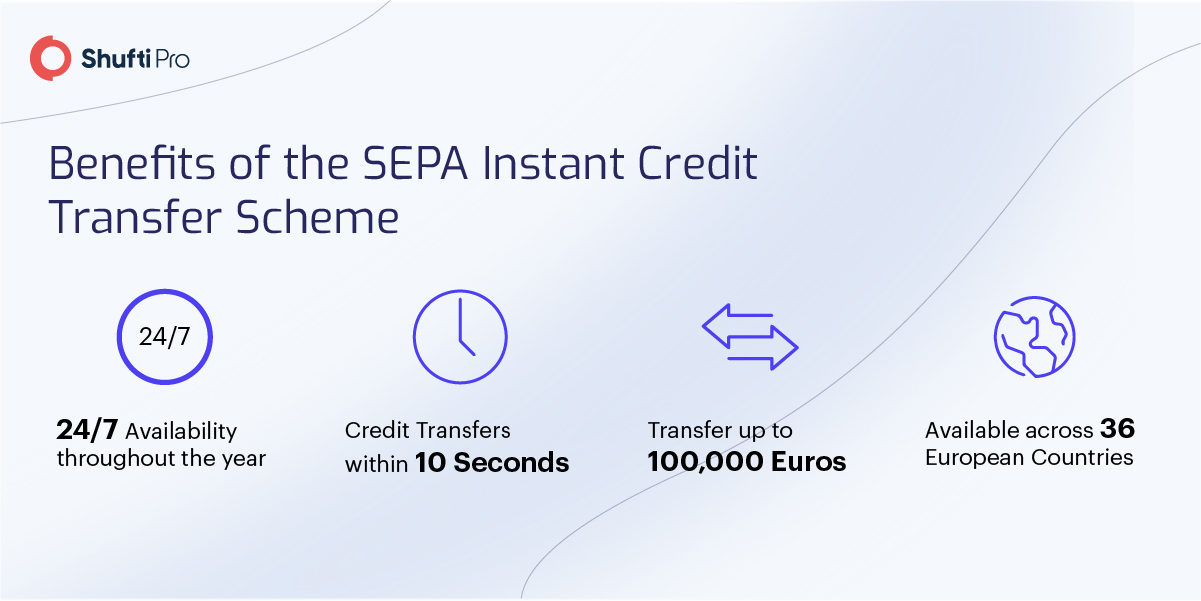Securing Instant Money Transfers in the Banking Sector – EPC’s New Rulebook

- 01 The Need for Instant Payment Services in Europe
- 02 SEPA Instant Credit Transfer Scheme (SCT Inst) - An Overview
- 03 SEPA Instant Credit Transfer Rulebook
- 04 Prominent Changes Introduced in 2023 SCT Inst Rulebook
- 05 Risks of Financial Crimes in Instant Payment Services
- 06 Ensuring Smooth Implementation of SEPA Instant Credit Transfer Scheme
- 07 How Shufti Can Help
Financial services have always played a vital role throughout the entire history of advanced human civilization. In the modern world, when war fronts have shifted from a battlefield to economic and technological arenas, most developed world countries are putting maximum efforts into adapting the latest payment methods for daily monetary transactions. The faster the payment transfer method, the more chances for the economy to oscillate faster. Instant payment services are quite prevalent nowadays and have altogether revolutionized the entire financial sector by providing swift services to users across the globe.
In the UK alone, £1.3 billion was stolen in 2021 through different fraudulent techniques. Moreover, 195,000 cases were reported for payment fraud in the same year, which shows the financial sector’s vulnerability. In the wake of the rising crime rate in the monetary sector, the European Union initiated the instant payment solution “SEPA Instant Credit Transfer (SCT Inst),” which ensures local and cross-border euro credit transfer throughout the Single Euro Payments Area (SEPA) zone. Although highly secured, it is still vulnerable to crimes, particularly money laundering and identity theft which should be taken into account through advanced security measures.
The Need for Instant Payment Services in Europe
The European Union is a vast financial market comprising 36 countries where the authorities have developed a trade-free zone called ‘SEPA’ across the member states to ensure smooth trade. Due to rapid digitization, customers demand fast payment methods and settlement times for fund transfers which has urged the authorities to find powerful money transfer methods that can facilitate the users. In order to establish a speedy process, there are a large number of instant credit payments providers in the EU, including Bluesnap, Vapulus, Skrill, and 2CheckOut, working in all these countries, which have provided a lot of ease to users and businesses. These instant electronic payment methods have greatly helped in establishing trust between clients and their customers.
Banks across Europe are also providing instant payment services by connecting to the SEPA Instant Credit Transfer scheme. Instant Credit Payment policy by the European Payments Council (EPC) has facilitated the whole economic system by introducing the most viable and fast options for money transfers. The excellent part of the Instant Payment Credit scheme is that it is available to both individuals as well as businesses, allowing for the transfer of Euro credits anywhere across the territory in a matter of seconds.
SEPA Instant Credit Transfer Scheme (SCT Inst) – An Overview
SEPA Instant Credit (SCT Inst) is an optional payment scheme that was launched in November 2017 by the European Payment Council (EPC). It provides an instant payments solution that is available 24 hours a day on all calendar days of the year, allowing the transfer of up to 100,000 euros to other accounts in less than 10 seconds. The primary aim of introducing the Instant Credit Payment scheme was to avoid fragmentation of the SEPA payment landscape while providing a real-time borderless payment solution with efficiency and consistency. All the financial transactions under this scheme are subject to a uniform set of standards and conditions through which the money can easily circulate in national markets.
Instant Credit Transfer Scheme Features
- Instant Credit Payment is based on XML ISO 20022 and SEPA Credit Transfer standards. It is available 24 hours a day, 365 days a year; there are no cut-off times.
- The maximum execution time for Instant Credit payment is 10 seconds, and the funds are immediately available for the beneficiary.
- The full amount is credited to the beneficiary; and the shared fees are mandatory.
- The maximum amount of SEPA Instant Payments is 100,000 euros per payment.
- The Remittance Information of 140 characters and End-to-End ID of 35 characters supplied by the payer is forwarded in full and without alteration to the beneficiary.
Requirements to Make a Payment Through Instant Credit Payment Scheme
Payment Service Providers (PSPs) are required to submit the following items to make a payment:
- The IBAN of the account
- The amount of the payment
- The IBAN of the account of the Beneficiary to which the payment is to be made
- The name of the Beneficiary to whom the payment is to be made
- The Originator’s reference for the payment, if applicable
- Any other data or information required to be included under the SEPA Rulebook or requested by the Bank from time to time

SEPA Instant Credit Transfer Rulebook
The European Payment Council (EPC) has issued a detailed rulebook comprising a set of guidelines to establish a framework for an instant credit transfer scheme. The authorities keep updating the rulebook as per the prevailing financial circumstances in the region.
Let’s have a look at the Instant Credit Payment scheme version 1.1, which is currently implemented, and the latest one, version 1.2, which will come into effect from April 2023:
SCT Inst Rulebook Version 1.1
The SCT Instant Credit Payments rulebook currently in effect up to April 25 2023 at 08:00 CET is the 2021 rulebook version 1.1, which was enforced starting January 11 2022 at 08:00 CET. The Implementation Guidelines of version 1.1 are based on the relevant ISO 20022 XML message standards. It reflects the disbandment of the Scheme End-User Forum (SEUF) and makes it optional for banks and other financial institutions to follow this scheme.
SCT Inst Rulebook Version 1.2
SCT Instant Credit Payments Rulebook Version 1.2 will come into effect from 25 April 2023 at 08:00 CET up to 19 November 2023 at 03:00 CET. Version 1.2 has no specific impact on the business and operational rules compared to the previous version. It is also based on ISO 20022 XML message standards and proposes a few changes which will be disclosed in the next section.
Prominent Changes Introduced in 2023 SCT Inst Rulebook
- In order to cater both retail and Financial Institution-to-Financial Institution payment use cases, the term ‘Customer’ is replaced by the term ‘Payment Service User’ (PSU).
- The payment service users are allowed to send a structured address of the Originator and/or the Beneficiary in electronic Customer-to-PSP files.
- Inclusion of the Proxy/Alias of the payment account of the Originator and/or of the payment account of the Beneficiary as an optional attribute in certain datasets.
- Extra clarifications about the charging principles.
Risks of Financial Crimes in Instant Payment Services
Besides the fact that the European Payment Council (EPC) has enforced stringent security measures to halt criminal activities, there are still chances of money laundering and other financial scams. Instant Credit Payment scheme allows the transfer of Euro credits across all 36 countries which makes it highly vulnerable to money laundering. It is in the highest interest of all the platforms coming under this scheme to incorporate strict Know Your Transaction (KYT) and Anti-Money Laundering (AML) screening measures to discourage all bad actors from laundering their black money to other countries using the Instant Credit Payment scheme.
Ensuring Smooth Implementation of SEPA Instant Credit Transfer Scheme
Know Your Transaction (KYT) is the most reliable option for securing all the digital platforms coming under the instant credit scheme. By verifying the true identities of all the users through several methods, particularly document authentication and facial recognition, companies can keep a detailed record of customers and transactions, using it as needed in the case of any alleged criminal activity.
Moreover, the security system should be efficient enough to counter the money launderers who try to export their black money to other countries using digital channels. The Financial Action Task Force (FATF), European Union, and Interpol have accumulated vast data on money launderers in the form of sanctions lists which must be consulted in order to track criminals and report them to authorities.
How Shufti Can Help
Shufti’s reliable Know Your Customer (KYC) solution is the ideal option for all digital platforms opting for the Instant Credit Payment scheme. By incorporating advanced security checks, particularly biometric authentication of users and document verification using Optical Character Recognition (OCR) technology, companies can securely onboard customers and keep a record of financial transactions.
The AML screening solution from Shufti has access to 1700+ sanctions lists by global financial watchdogs and screens users’ data against them while generating results in a matter of seconds with a 99% accuracy.
Would you like to know more about our AML solutions to comply with the Instant Credit Payment scheme?

 Explore Now
Explore Now













